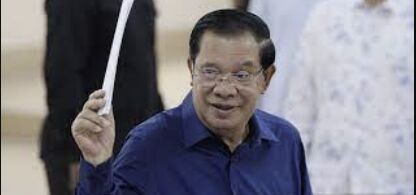Cambodian Prime Minister Hun Sen Resigns After 40-Year Reign of Oppression, Hands Power to Son Amidst Criticism
Cambodian Prime Minister Hun Sen resigns after almost four decades of dictatorial rule, naming his son as his successor. Critics argue that the recent election was rigged and lacking in fairness. Under his leadership, Cambodia has grown closer to China but has also suffered from corruption and environmental destruction. Human rights groups accuse Hun Sen of suppressing opposition through the legal system, resulting in the conviction and imprisonment of many politicians and activists. The new prime minister, Hun Manet, may bring a different approach, but doubts about significant change persist.
Cambodian Prime Minister Hun Sen has announced his resignation after nearly four decades of ruling with an iron fist. The 70-year-old leader, who has eliminated all opposition and stifled freedom of expression during his tenure, will pass on power to his eldest son, Hun Manet.
The ruling Cambodian People's Party (CPP) won a landslide victory in the recent election, where the only serious challenger was disqualified on a technicality. Election observers, including Western powers such as the United States and European Union, have criticized the poll as neither free nor fair.
Hun Sen has made it clear that he intends to retain influence even after stepping down. He will assume the role of president of the senate and act as head of state when the king is overseas.
On 10th August 2023, Gen. Hun Manet will succeed his father, Hun Sen, who has ruled Cambodia since 1985. Manet, who attended several prestigious military colleges & holds a PhD (University of Bristol), has been commander of the Royal Cambodian Army. pic.twitter.com/j8xceYAVx4
— Duncan Abigaba (@DuncanAbigaba) July 26, 2023
Under his rule, Cambodia has grown increasingly close to China, benefiting from Chinese investment and infrastructure projects. However, this influx of money has brought problems such as casinos and online scams, often involving trafficked workers in deplorable conditions.
Cambodia is also plagued by environmental destruction and widespread corruption. Rights groups accuse Hun Sen of using the legal system to suppress any opposition, with scores of politicians, activists, and union leaders being convicted and jailed throughout his reign.
Exiled opposition leaders, including Sam Rainsy and Kem Sokha, have faced severe restrictions, with Rainsy banned from running for office for 25 years and Sokha sentenced to 27 years in prison on charges of treason. Hun Manet, a 45-year-old four-star general, will take over as prime minister.
Some speculate that his leadership may be less repressive and more receptive to human rights activism due to his education at West Point and the University of Bristol. However, critics remain skeptical as to whether Cambodia's political landscape will change significantly under his rule.




